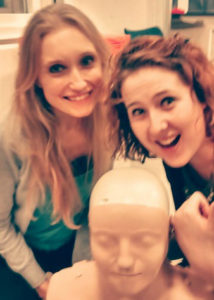So it’s coming up to that time of year again when every medical student across the country can no longer banish all thoughts of exams to the backs of their minds, but has the sudden realisation that actually two months isn’t that long to revise everything they have tried to teach you this year.
“I’m not going to pretend that I have mastered the exam stress yet; I still get stressed about exams. Okay so being totally honest, I get very stressed! But every year after all the exams are over I look back and wonder why I let myself get into such a state? What was it all for? Did I really need to get so worked up about it all? And was it really worth it?”
Then last summer, after battling through my second year exams at the same time as dealing with a heck of a lot of family-related stress, I had a little revelation which I want to share with you so here are my top tips for coping with that exam stress this year…
No. 1: Take time for a treat.
We’ve all been told a hundred times that we need to create a revision timetable, scheduling our work with lots of short breaks to keep us focused. Don’t get me wrong, having a schedule is good, and if this method works for you then please just ignore me on this point, but I realised that personally I go absolutely mad knowing that every day will be the same routine for the next two months! Having nothing to look forward to made me lose motivation and wonder: ‘what is the point?’.
“Give yourself a treat and something to look forward to say once a week. And I mean a proper break! Not just another 20 minutes in which you go into your kitchen, make yourself yet another cup of tea, and search the fridge yet again just in case something delicious has magically appeared this time!”
Start your revision early so you have time to schedule in a whole afternoon each week to go out, see your friends and do something actually fun!
No. 2: Find something short and sweet.
Find a light-hearted series with short 20 minute episodes so you can watch one episode in each break and that’s it! Something that you’re not going to end up binge-watching or constantly telling yourself ‘just 5 more minutes’. It really helps for those rainy revision days. I can tell you I got through a lot of episodes of ‘friends’ in this time!
No. 3: Don’t be a hermit.
Please please please, whatever you do, do not become a complete hermit and never leave your flat or see another human being. I honestly don’t think anyone can get through that and come out the other side as a whole person.
“Go outside, find the sun, go to the parks and big green open spaces.”
My personal favourite in London is St James’ park. Going there instantly makes me feel happier and puts me in a more productive mood.

No. 4: It’s okay to cry.
Okay so now piece of advice number 4 may sound strange, but let yourself have the occasional mini-breakdown. When we get stressed we get emotional, and when we try to contain it for too long it doesn’t always end too well.
“So just occasionally, when it all feels too much, let yourself rant, shout, burst into tears…whatever it takes to get it all out.”
Personally, I went through a stage of crying probably about once a week last year when it all got too much and each little cry would always end in me laughing at the ridiculousness of it all and feeling so much better again.
No 5: No more perfectionism.
Now this is going to be difficult for some of you but my next piece of advice, especially to those of you in your first year, is that you need to adjust to medical school exams and learn to accept the fact that you are not going to be able to memorise everything. Many of you will have come from the top schools, will have consistently achieved the top grades, and are used to getting 90%+ in every exam. It can be hard adjusting to med school exams where that is just not possible.
“Try to accept that you are not going to be able to learn every minute detail and every single fact your lecturers ever told you. It will drive you crazy if you try.”
No 6: Gain some perspective.

Having said that, you get one shot at this and it’s worth working hard so really do try your best.
“But I think the key thing that I have realised over the last year is that it is so important to maintain some perspective.”
In 30 years’ time when you are a consultant on the wards no one is going to worry about the fact that you got 63% on your Year 1 MCQ instead of 64%. There will always be another exam to study for, or another job to work towards; there’s always the next step to aim for. You’ve got to know that you can be a skilled, knowledgeable doctor at the same time as being a happy one who is enjoying their life and not studying 24 hours a day. So what is so important is finding the balance between work and maintaining your social life, your hobbies and your relationships with friends and family. After all, it is these things that make us interesting, individual people that our patients can relate to, and therefore better doctors overall.
by Lydia Shackshaft, Medical Student, King’s College Hospital, London
 Having loved learning about the human body throughout my time at school, and filled with enthusiasm for medicine after shadowing some incredibly inspiring doctors, I moved from the beautiful countryside of Norfolk to study medicine at King’s College in the amazingly crazy city of London. This was the best decision I’ve ever made and I’ve never looked back!
I’ve now completed the first 2 years of my medical degree and am also currently working as a healthcare assistant to get some extra experience of the realities of hands-on patient care. I enjoy working with children more than anything and hope that I can translate this into a career specialising in paediatrics, possibly combining this with my particular interest in neuroscience.
Having loved learning about the human body throughout my time at school, and filled with enthusiasm for medicine after shadowing some incredibly inspiring doctors, I moved from the beautiful countryside of Norfolk to study medicine at King’s College in the amazingly crazy city of London. This was the best decision I’ve ever made and I’ve never looked back!
I’ve now completed the first 2 years of my medical degree and am also currently working as a healthcare assistant to get some extra experience of the realities of hands-on patient care. I enjoy working with children more than anything and hope that I can translate this into a career specialising in paediatrics, possibly combining this with my particular interest in neuroscience.